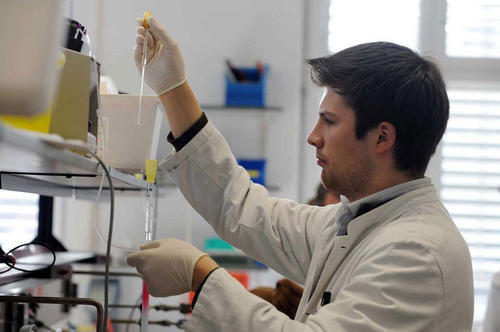Science on a Minute Scale – With a Big Future
The Center for Supramolecular Interactions studies interactions between molecules
Aug 18, 2011
At the Center for Supramolecular Interactions, scientists study molecules at the nanoscale.
Image Credit: David Ausserhofer
Molecules are not loners. Like people, they generally live as part of a community, with a wide range of different relationships with other molecules creating cohesion between them. Chemists call these kinds of “communities” of molecules supramolecular assemblies, or “supermolecules.” Plus, as in many other areas, the whole is more than the sum of its parts: The properties of supermolecules are different from those of any of the individual molecules that form them. Researchers at the Center for Supramolecular Interactions (CSI) at Freie Universität Berlin are working to identify the interactions that take place between molecules in order to develop supermolecules with new capabilities – tailor-made for use in medicine, computer technology, or industry.
“Our research centers on developing supramolecular structures and studying their properties,” says Allison Berger, the center’s scientific coordinator, describing the work performed at the CSI. The search for the molecular systems of the future is truly a communal task; nearly 40 researchers from various institutions in Berlin currently work on the 15 projects organized by the center.
They come from Freie Universität, Humboldt-Universität, the Max Planck Society, the Helmholtz Association, the Max Delbrück Center for Molecular Medicine (MDC), and the Fraunhofer Institute for Biomedical Engineering (IBMT), and from a range of disciplines, including chemistry, physics, biology, and mathematics. “Our work is very interdisciplinary,” Berger says. “The mathematicians, for example, create models that show how molecules interact with other molecules. And chemists synthesize the building blocks that can be used to create new supramolecular systems. Since those systems have very complex properties, physicists develop new analytical methods to characterize them.”
All of these activities are geared toward an overarching aim: The researchers want to not only understand the bonds that hold supermolecules together inside, but also design molecules with specific functions, which could open up a wide range of potential uses: Designer supermolecules could be used as switches and circuit tracks for powerful microcomputers of the future, as molecular “solar cells” to generate energy, which could be applied as a coating on building roofs or vehicles, or as sensors that detect toxins in the air and emit a light signal as a warning.
The CSI was founded in July 2009 and is co-chaired by Beate Koksch, a professor of organic chemistry, along with her colleague Professor Christoph Schalley and physics professor Karsten Heyne. The center has received more than 500,000 euros to date from the Center for Cluster Development (CCD) at Freie Universität, the body responsible for coordinating the long-term development of research at the university. The funding comes from resources provided by the Excellence Initiative jointly sponsored by the German federal government and the governments of the German states, which selected Freie Universität Berlin in 2007 as one of the nine universities in Germany to receive funding under the program.
The money is used for doctoral and postdoctoral students and for materials, such as chemicals, equipment, and supplies. Its work makes the CSI part of the Nanoscale Focus Area of Freie Universität, an interdisciplinary research alliance in which researchers study the properties of materials on scales of down to one millionth of a millimeter.
And because science on such a minute scale has a big future, the researchers also plan to establish a permanent training program for doctoral students at the CSI. “Our aim in so doing,” says coordinator Berger, “is to offer students, including doctoral students, a comprehensive view of issues that are necessary for research and applications in the field of supramolecular interactions.”
Further Information
Dr. Allison Berger, Freie Universität Berlin, Institute of Chemistry und Biochemistry - Organic Chemistry, Tel.: +49 (0)30 838-52785, Email: aberger@chemie.fu-berlin.de

